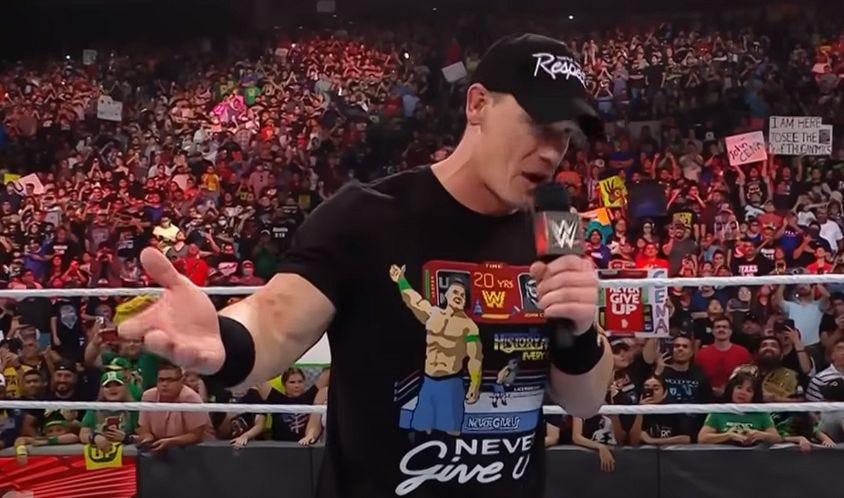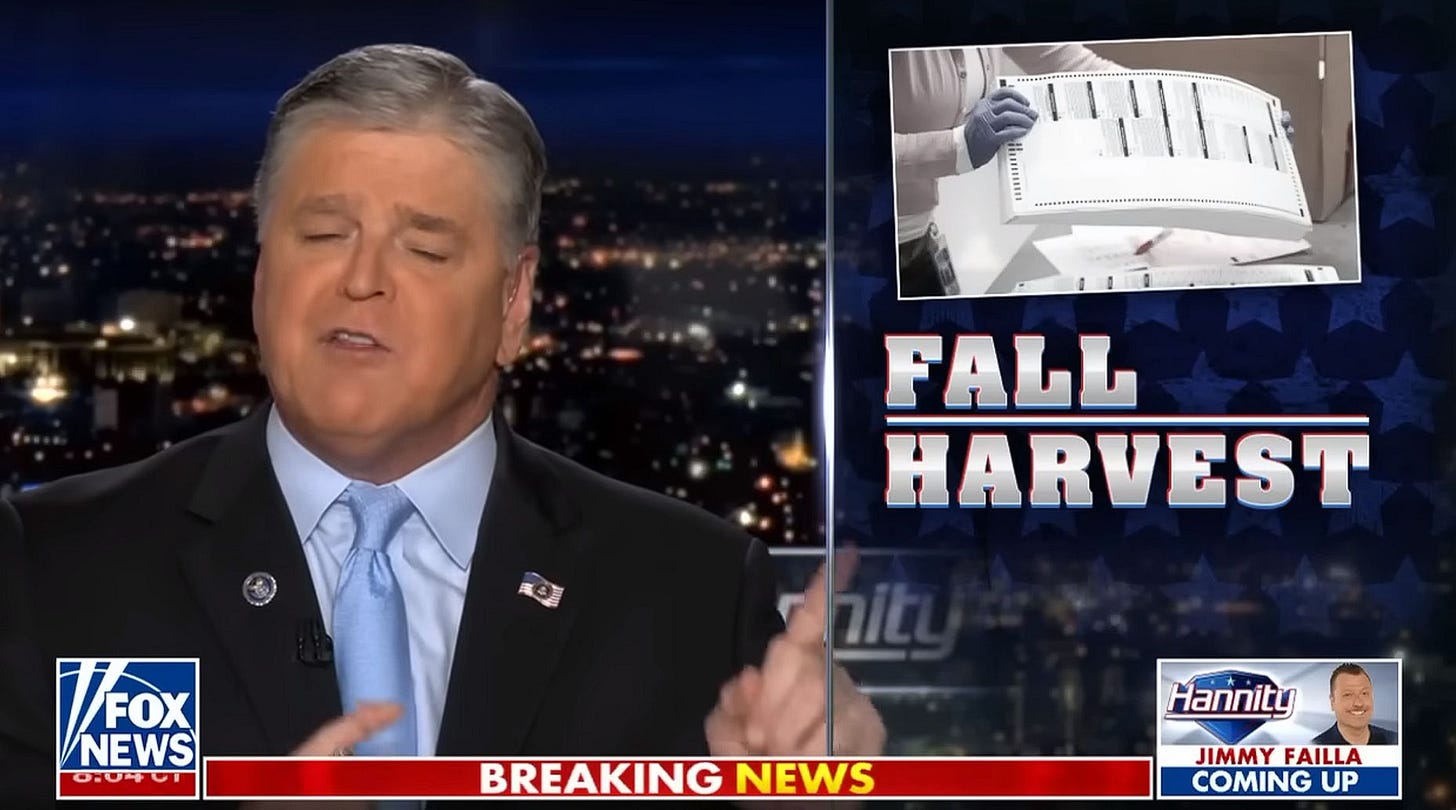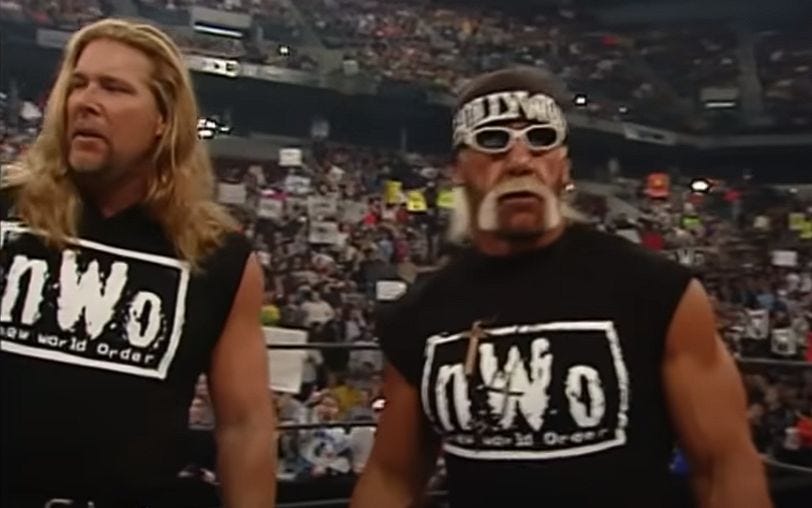This newsletter/column is supported by your subscriptions. I won’t be putting any regular content behind a paywall and I appreciate your continued support. Click here to subscribe!
I did an interview with Aaron Rupar’s Public Notice, wrapping up the racism behind Herschel Walker’s failed Senate campaign
I did an interview with Joshua Holland’s “We’ve Got Issues” about how the right is turning themselves into a freak show.
Ok, now on to the main event!
I have been a fan of professional wrestling for over 35 years now, from the days of Hulkamania in the 1980s, to the “attitude” era of the late 1990s and up until the present day. Wrestling is a profoundly silly form of entertainment, centered around grown adults acting like children and hitting each other. It is over the top, often racist and sexist, and involves the use of spectacle to entertain millions of people.
Which is why it is the perfect framework for understanding American politics.
I’ve been writing about politics for over 21 years now, when I first launched my blog in 2001. Since I’ve been doing this, my personal experience as a wrestling fan has acted as sort of a red pill, allowing me to see what is “really” going on here. If you are into wrestling, it is impossible not to see the same dynamics that play out every week in the squared circle that is the wrestling arena coming to life in one of the most important areas of our lives: politics.
It is true that an important element of this is the career of Donald Trump, who appeared as a character (basically playing himself) on WWE wrestling and is in the WWE hall of fame. And while the prominence of Trump and his actions have helped bring the wrestling/politics parallels to light — it goes way beyond Trump. Like with so much else, he’s just a loud symptom of an issue that has gone on for decades and involves much more than him.
Feuds
The feud is central to wrestling. Non-wrestling fans wrongly believe that the wrestling match is key to wrestling, looking at wrestling the same way you’d look at a real sport like football or basketball. But in wrestling, the actual match where wrestlers come to blows is merely the punctuation for what fans really tune in for week after week: The feud.
In wrestling terminology, it is called a “program,” and that is the key soap opera style element of wrestling. A match that just occurs without a dramatic backstory is uninteresting and won’t attract enough fans to buy a pay-per-view ticket (or in modern wrestling terminology, subscribe to NBC’s Peacock service for a “premium live event”). But what will get fans to tune in is something with a juicy backstory.
Usually in wrestling this involves something stupid for the wrestlers to argue about. Sometimes it is set up as a love triangle, where each wrestler expresses their love or admiration for a third person, who is also the girlfriend/spouse/etc of another wrestler. And the best way to settle this dispute is of course a wrestling match.
Sometimes a feud is as simple as one wrestler asserting he or she are just better than the other, repeatedly insulting the skills or fame or wrestling technique of another. Of course the match at the end of the feud will conveniently settle this dispute “once and for all.” Of course it will.
Wrestlers spend weeks sniping back and forth at each other, escalating the dramatic tension, talking about each other to the audience (more in that in a second), elevating the tension and building anticipation for the inevitable clash. Fans of the show tune in to find out the latest developments between Stone Cold Steve Austin and WWE executive Vince McMahon, what The Undertaker and Mankind will do to each other now — ahead of their confrontation at Summerslam. What will Bianca Belair do in response to Becky Lynch calling her a “phony” last week?
Oh, the drama!
We get this kind of tension all the time in American politics. Generally speaking, politicians are not vying for the attention of a lover that will be resolved in a congressional floor vote (at least openly), but every day in politics there are these rhetorical clashes that occur between the parties.
Republicans and Democrats are always in the middle of “working a program” with each other, informing their bases of voters that the other side is weak, unpopular, and worthy of defeat. Tension is escalated, and particularly during campaigns this builds to a single clash point, the election, where all will be put on the line in a no-holds-barred battle that finally resolves who is the better man or woman.
In the 2022 midterm election the best feud was Democrat John Fetterman against Republican Mehmet Oz. For sure, it certainly helps the parallels when now-Senator elect John Fetterman has the height, demeanor, and tattoos of a wrestler, but the campaign between the two men was a classic wrestling-style feud.
They even both filled in the sort of stereotypical caricatures that are frequently used in wrestling to communicate to the audience what kind of “character” each man was. Fetterman was the edgy, hip “outsider,” a straight talker who made punchy quips and put-downs about his opponent. Meanwhile Oz was the more refined elitist, a wealthy television celebrity who campaigned against the image he painted of Fetterman as a leftist bomb thrower.
To their respective audiences, both Fetterman and Oz portrayed themselves as the heroes of the story, with the other guy as the no-good villain who would ultimately face the judgement of the people on Election Day, America’s premium live event for politics.
Tune in! You’ll be entertained! Who knows what will happen next!
Promos
Fetterman and Oz also exemplified another key element of wrestling during their campaigns: Cutting a promo.
In wrestling language, a promo is a speech or video that is made to set the terms of the feud. The best wrestlers are generally not the people who are best at the athletic elements of the performance. While in-ring skills are important, once the outcome of a match is scripted and predetermined, it doesn’t matter as much as say the relative sports skills of the L.A. Lakers and Milwaukee Bucks.
The best wrestlers are the ones who can cut a good promo to get a reaction from the audience. Key to wrestling is that the reaction doesn’t necessarily have to be a positive one. In wrestling, the “good guys” are referred to as “faces,” while the “bad guy” characters are “heels.” The goal for both the faces and heels isn’t always getting the audience to back you, but to get some kind of reaction.
A wrestler’s career is doomed if they don’t provoke a response. It means the audience doesn’t care, that they aren’t invested in the feud and they don’t have a reason to pay attention to the resolution at the main event. For a heel, you want the boos. It’s a sign that there is an emotional connection at play, even if it is a negative one.
Donald Trump is a heel.
Trump is not a smart man but he works American politics like the best wrestling heels do. During the 2020 election cycle I had to watch dozens of his campaign rallies, and it was eerie to see him doing the same sort of things I have watched wrestling characters like Macho Man Randy Savage and John Cena do for decades.
Trump does not deliver traditional political speeches and it is clear that he is bored and his core audience is bored when he has to deliver them. Trump cuts promos. He goes off into tangents, looking for the right combination of words and phrases that will provoke a reaction from the audience. Because he is an inch deep, it’s easy to watch the gears turning as he speaks and looks for a “pop” from the crowd. Trump even sometimes will comment in real time to his audiences — like a wrestler — acknowledging their reaction to his promo.
That’s how he came up with some of his most infamous lines of attack that he has deployed during his time in politics. The conservative audience loves to chant “lock her up” about Hillary Clinton, or scream and howl about “Space Force” or “build the wall.” These are the kind of punchy phrases that would be perfectly at home on an episode of WWE Monday Night Raw.
But not only do Trump’s most ardent fans love these phrases, but they provoke rounds of boos and hisses from liberals like myself. Like the best wrestlers, Trump provokes an emotional response — positive and negative. Compare his ability to to do that to the rest of the Republican presidential field in 2016. Did any of his fellow candidates get the blood of liberals boiling the way Trump did when he’d throw out red meat like banning Muslim travel to the U.S. or refer to Mexicans as rapists? Of course not. It was vile, vile stuff but it served his political purpose like talking about kicking someone’s ass works for a pro wrestler.
The ability to cut a promo in American politics is a good indicator of raw political skill. Few people in politics are as good on the microphone as former President Barack Obama, who could be a main event wrestler. Obama intuitively understands how to rhetorically jab at political targets, taking the audience along on a storytelling journey that builds to a crescendo — then he asks them to buy the pay-per-view— I mean, to get out there and vote. During his successful presidential campaigns, Obama emulated figures like The Rock, telling supporters to “knock on some doors for me,” engaging them with easy to understand terms to frame the terms of complex political fights in a way that the average Joe or Jill could easily understand.
The Announce Table
Wrestling announcers don’t just tell the audience about the in-ring action during a match. They highlight the action and explain the significance of a chokehold and hand out names for signature wrestling moves (“The Five Knuckle Shuffle”), but their real role is as storytellers. The announce table is the connective tissue for wrestling, linking promos and matches and other elements to present a fully formed story to the public.
A wrestling announcer doesn’t just tell the audience that, for instance, Stone Cold Steve Austin punched Mr. McMahon in the crotch merely to get an advantage over him in a fight, but tells the audience that Austin is an edgy outsider who is attempting to “send a message” to the suits that they “they can’t control him,” and that he’ll “go over the line” to make that clear. Now you’re telling a story.
Announcers are there to hold the hands of the fans and the best and most memorable ones will take sides instead of operating as dispassionate third party observers. Arguably the most well-loved wrestling announcer has been Jim Ross aka “JR,” a cowboy hat-wearing Oklahoman who dramatically told audiences that “business just picked up” and that a fight would be a “slobberknocker.” Ross escalated the dramatic tension of a match so that its no longer two people pounding on each other, but is instead an epic contest between good and evil. So when Ross tells you, “good God almighty, he has broken him in half,” you go along for the emotional rollercoaster.
This is political media.
Political media fills the role of the wrestling announcer, and it isn’t just open partisans of the left and right who are cheering on their teams in venues like Fox News and MSNBC. This includes the mainstream media, who are not dispassionate third party observers who are merely describing events without playing a role in them. They are a part of the show.
Political media sets up heroes and villains, heels and faces, informing the audience not just of what is happening but purportedly telling them why it matters, how it all fits in, and how it escalates the ongoing feud and sets up the stakes for the coming showdown.
The media crafts the narrative, working as a series of announce tables for the matches — elections — to come.
Heel And Face Turns
Sometimes in politics, a figure that has been associated with negative issues goes against the grain and does something good. Most recently this dynamic played out with Sen. Joe Manchin (D-WV), who frequently has thrown sand in the gears of progressive dreams, making onerous conservative demands that have watered down liberal legislation. It was Manchin who put a stake in the heart of the Build Back Better bill, arguing that it was just too costly to execute.
But then, out of nowhere, Manchin got behind the Inflation Reduction Act, a slimmed down version of the previous bill that nonetheless included many of the key progressive policy requests, most notably a massive infusion of spending on efforts to reduce climate change.
In wrestling they call this a “face turn.”
The most enduring wrestling characters change and morph through the ages, sticking to some archetypes and catch phrases and in-ring moves, but they cannot remain static. So from time to time a wrestling hero or villain will take a “turn.” A bad guy will finally decide to do something that pleases the audience, or a hero will turn his back on the crowd, insulting them. It is all in service of keeping the audience engaged and activated, because again, boredom equals creative death.
Probably the most infamous heel turn occurred when Hulk Hogan, the steroid-enhanced hero and biggest figure in 1980s wrestling, suddenly became Hollywood Hogan, the bearded bad guy who yelled at the audience. This sudden switch was an earthquake in the world of wrestling and led to years of engaging storylines.
When Manchin turned into a face, albeit briefly, it was hard to see it without a wrestling context. Here was someone disrupting the storyline we all expected, who had his previous allies (Republicans) howling in anger while his long-time nemeses (progressives) were in shocked approval.
Are you not entertained?
Stables
Wrestling isn’t only about one-on-one competitions between wrestlers. Some of the best wrestling feuds involve team-ups, groups of wrestlers arranged into what are called “stables.”
These can vary from the previously mentioned “Hollywood” Hulk Hogan, who led the New World Order (NWO) group of wrestlers in a purported “invasion” of WCW Wrestling, to the Corporation, which was led by WWE’s Vince McMahon and his daughter Stephanie McMahon, as a symbol of evil business-suited power mercilessly interfering in the lives of wrestlers like The Rock and “Stone Cold” Steve Austin.
Stables work sort of like sports teams, giving a brand to a group of wrestlers who then fight on behalf of their affiliation.
In politics, the various caucuses and informal alignments serve a similar function. For progressives there are groups like Squad, which include Reps. Alexandria Ocasio-Cortez, Rashida Tlaib, Ilhan Omar, and others. On the right there have been factions like the Tea Party Caucus and the Freedom Caucus, pushing for right wing ideas and pet feuds.
Especially for politicians who aren’t high profile enough to have a platform of their own, like wrestlers it benefits them to be part of a stable. It allows the public to immediately know where they stand, not just as a Democrat or Republican, but through ideological affiliation.
Are you one of The Squad, or are you in the Tea Party? Might as well offer t-shirts for sale to complete the whole brand identity.
The Main Event
Elections are the must-see pay per view spectacular events of politics. Just like wrestling they often culminate in fireworks, balloons, crying, and cheering crowds. Elections work as the end point to a program, the culmination of a feud into the final answer.
Will reigning champion Donald drop his belt to Joe Biden? Will scrappy challenger Kevin McCarthy finally take down Nancy Pelosi and raise the Speaker’s gavel over his head, showing off for the crowd?
Election day is more like the Wrestlemania of politics than it is the Super Bowl.
And also like wrestling, the main event doesn’t always mean the feud is over, just that the status quo is reshuffled. Even if Democrats win, The Squad still has a beef with the Freedom Caucus. Even as Joe Biden is declared the Presidential Champion, Donald Trump is still cutting promos, asserting that he is the true top man for the entire promotion.
Elections are huge main events that make a statement, but they also set up future storylines for upcoming clashes, possibly recasting heels as faces and vice versa, shuffling the roster of particular stables and attracting mass attention by resolving multiple feuds. They even have a distinct pecking order, like the undercard matches of a wrestling event that lead up to the big championship bout. There are individual races featuring characters you’ve followed for years, members of various stables and caucuses facing off, and contests to determine who is in the majority and relegated to the minority.
It is an overwhelming, emotional journey, and then a few days or weeks later everything resets, and we are once again collectively on a path to the next big clash.
You May Not Like It, But Accept It
In discussing this phenomenon and these parallels, I often encounter revulsion. Politics shouldn’t be like this. It shouldn’t be a giant wrestling-style spectacle. It should be levelheaded presentations of policies and ideas combined with civic engagement and earnest consideration of the issues at hand.
To quote my favorite wrestler, Dwayne “The Rock” Johnson, “It doesn’t matter what you think.”
Politics as wrestling-style spectacle is where America has been for decades, arguably for hundreds of years. American politics has never been this calm-minded and sober activity we mythically portray it as. The founders didn’t have arenas and microphones, but they talked smack about each other’s ideas and personal lives in the very first American newspapers.
It has always been like this and if anything we’re just being more honest and upfront about it now. I don’t really think there’s any mythical “good place” to go back to. It is what it is.
That is why I have frequently advocated for Democrats, liberals, progressives and others on the left side of things to quit trying to swim against the tide. The right is overall much better at the spectacle and conflict of elections and it has served conservative policy goals well.
When Democrats and liberals have thrived it has often been through adopting these skills, setting up conflicts and furthering a storyline, in the same fashion as professional wrestling.
This is the world we live in. We live in the political equivalent of a series of wrestling matches, and while the endings are not predetermined the stakes are far higher. So instead of looking down on what supposedly got us here, we should instead strive to excel at the absurdity in pursuit of the greater good.
“You may not like it, but accept it” - Macho Man Randy Savage, oh yeah brother.
I recently launched subscriptions for this newsletter and I’d appreciate if you would join. Nothing is going to go behind a paywall and this will always be free. Thanks!
— Oliver
Follow me, Oliver Willis, on Twitter @owillis/Mastodon: @owillis@mastodon.online
Exclusive Kal-El Photo
Kal tolerates me watching wrestling, as long as I sit still and don’t disrupt his life too much.













You know I'm with you on this one! I agree that Trump does the heel stuff pretty well, but maybe he's more of a tweener. I think that dynamic is something a lot of political operatives missed. He's a rich guy, but his gimmick in 2016 was that "I alone can fix it" because he'd been on the inside giving money to Democrats and Republicans for years. It'd be like if Ted DiBiase said he was gonna take down Vince McMahon or something. "Yeah, I'm a heel, but my opponent? Wow, my opponent is a worse heel but she / he won't admit it." In polisci terms, he won over the voters who disliked him and Clinton, as a for instance.
I think this idea has been explored so often that this borders on plagiarism. Matt Taibbi wrote a whole book on the topic.
Well written piece here, but highly unoriginal with no credit given. Just a rehash with updates for some recent US bourgeois politics